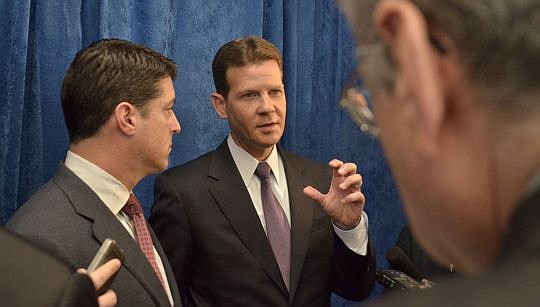
In what one critic of the Legislature called an “unprecedented admission,” the Florida Senate conceded Tuesday the chamber’s districts are unconstitutional and should be redrawn in a special session beginning in October.
An agreement between the Legislature and a coalition of voting-rights groups and citizens that challenged the Senate map raised the possibility of concluding a three-year legal saga over the once-a-decade redistricting process.
The court battle exposed how the state’s political boundaries were drawn and set new precedents under the anti-gerrymandering “Fair Districts” constitutional amendments approved by voters in 2010.
The deal also comes less than three weeks after the Florida Supreme Court struck down eight of the state’s 27 congressional districts for violating one of the amendments — a case that was ominous for lawmakers because opponents of the map felt they had an even stronger case against the Senate plan.
“July has been an amazing month for these clients,” said David King, a lawyer for the League of Women Voters of Florida and Common Cause Florida.
Under the agreement submitted Tuesday to a Leon County judge, critics of the map won a near-total victory. The Senate districts will be redrawn in a special session that will start Oct. 19, and the Legislature will have to prove to the court that its map follows the Constitution, rather than the plaintiffs being required to show that the districts were unconstitutional.
“This appears to me to be an unprecedented admission,” King told reporters in a conference call. “This is remarkable. The Florida Senate has admitted that they drew an unconstitutional map and, as a consequence of that, they now have agreed to fix the problem.”
The agreement means, even if all goes as planned, the Legislature will have held three special sessions in 2015 — one to resolve a health-care budget crisis, another to redraw the congressional lines and the October session to approve new Senate districts.
The Senate session will also mark the fourth time lawmakers have held a special or extended meeting to correct flawed redistricting plans.
King said the discussions about a settlement of the Senate map began after the Supreme Court decision on the congressional plan. In a memo issued to lawmakers announcing the deal and the special session, Senate President Andy Gardiner and House Speaker Steve Crisafulli made no secret of the impact of the Supreme Court ruling.
“This opinion will govern the ongoing litigation concerning the Senate map adopted by the Legislature on March 27, 2012,” wrote Gardiner, R-Orlando, and Crisafulli, R-Merritt Island. “Given these implications, the Senate has entered into a stipulation and consent judgment with the plaintiffs and agreed the enacted Senate map will be revised prior to the 2016 primary and general elections.”
Between changes to the congressional map and the Senate districts, the state’s political landscape could be dramatically altered over the next four months.
The special session to redraw the Senate map will start about two months after a special session to craft new congressional districts, scheduled for Aug. 10-21.
Any challenge to the congressional rewrite will be heard by Leon County Circuit Judge Terry Lewis beginning Sept. 24. The Supreme Court will ultimately consider that map again.
After the October special session, the Senate redo will go before Leon County Circuit Judge George S. Reynolds III, likely sometime in November.
The litigation has already proven costly for the state. Lawmakers have spent more than $6.7 million since July 2009 on the redistricting process — either preparing for, drawing or defending the maps for the House, Senate and the state’s congressional delegation. And the tab could grow if those fighting the maps win a court order for the Legislature to pay their legal bills, a figure that will end up exceeding $1 million, King said.
Of the redistricting plans produced in 2012, only the House map has gone unchallenged. It also appears ready to escape the legal crossfire unscathed.
“We never had a problem with the House map,” said Peter Butzin, chairman of Common Cause Florida. “We felt the House map did abide by constitutional standards.”
In their memo, Crisafulli and Gardiner also explicitly exonerated the House from any involvement in the problems with the Senate map, which was drawn in the Senate as part of an agreement between both chambers to leave each other’s districts alone.
“By entering into this consent judgment, the Senate accepts full responsibility for the enacted Senate plan,” the leaders wrote. “The House was not involved in drawing the Senate map, nor did the House amend the Senate map prior to its enactment. The House did not intend to favor or disfavor any political party or incumbent, and had no knowledge of any constitutional infirmities relating to the enacted Senate plan.”